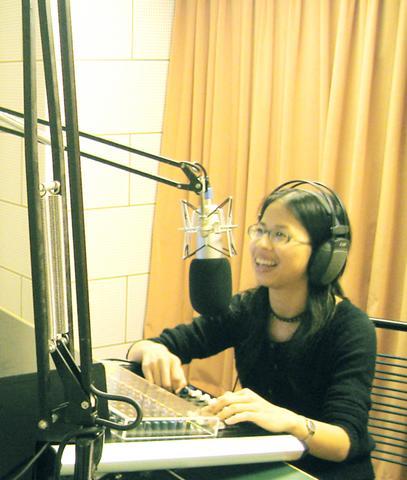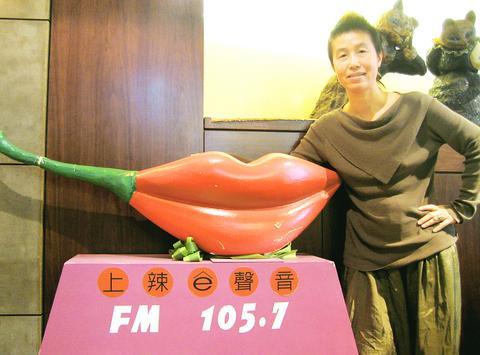Established to promote women's rights in the sleepy rural counties of Yunlin and Chiayi, Sister Radio (
The trial period was so successful that Asia's sole female-oriented broadcast network run by women for women became a permanent 24-hour fixture on the FM dial on Women's Day, March 8, last year. The station's popularity is now at an all-time high and even reaches audiences it never intended to reach.
Since it began broadcasting on Web radio the station has built up a solid reputation nationwide and now attracts thousands of listeners of both sexes on a daily basis throughout Taiwan.

The brainchild of ex-DPP lawmaker and longtime women's rights activist Wang Li-ping (
From the beginning, the station endeavored to capture a target audience of female listeners. According to the bleach-blonde and mohawked Wang, the station's main aim was (and still is) to bring women's issues and gender awareness to the forefront in rural areas, where such concerns once enjoyed little, if any media coverage. At the same time the station readily provides information for women suffering from spousal/family abuse, to those in need of help with regard to education and other matters.
There are plenty of resources available for women relating to gender issues in the cities, but very little in the country. Women in Taipei and Kaohsiung can pop into any one of dozens of bookstores and associations to find information, but there are very few bookstores here and the libaries offer nothing at all in the way of resources," said Denise Liang (

PHOTO: GAVIN PHIPPS, TAIPEI TIMES
As well as acting as a sorting house for information, the station works in close conjunction with women's organizations like the Yunlin County Color Purple Women's Association (
The station's format during the trial period proved remarkably popular and was one that the station management hoped to see continue, but Sister Radio was forced to alter it slightly after running into a couple of unforeseen, and somewhat bizarre obstacles.
Located in the heart of pirate radio station country, Sister Radio was forced to alter the language of many of its broadcasts early last year in order to distance itself from the many illegal "fake medicine-selling underground radio stations" (

PHOTO: GAVIN PHIPPS, TAIPEI TIMES
However odd it may seem, especially considering that Taiwanese is the most commonly used language in the Yunlin/Chiayi area, the prolific number of pirate radio stations operating in the region meant that the station had to revert to the use of Mandarin in order to gain credibility.
"It sounds stupid, but listeners really thought that we were a pirate radio station because our programs were in Taiwanese," said Liang. "We changed the format and suddenly people began to think of us as a genuine radio station. It's an odd turn of events, but there you are."
While radio station staff realize that by broadcasting principally in Mandarin they are distancing themselves from a large section of their original target audience, there is very little that can be done about it. A recent report states that the county's pirate radio problem is spiraling out of control. There are more than 10 pirate radio stations operating at any given time in the county, double the number of legal stations.
One of the oddest problems faced by the radio station in its fledgling days, however, stemmed from a misunderstanding surrounding its name and logo, which is a pair of red lips in the shape of a chili pepper. Sending the wrong message to some, the station became a target for large numbers of unwanted male callers.
Liang, or Little Witch (
"I think because of our name and the logo these people thought we were somehow related to the 0204 sex related chat-lines. I'd get numerous calls while on air from men asking if I'd be their friend and go on a date with them," she said. "It was embarrassing to begin with because the station was new and we were trying to make a name for ourselves."
The station still uses its spicy lips logo, but according to Liang, such calls have become more infrequent in the past year.
"We got used to it after a time and getting rid of them became second nature. We'd politely tell them that they were live on air and that they'd made a mistake. They'd hang-up quite quickly after that."
Initially aiming its programming toward a target audience of 30-year-old-plus females the station has slowly begun to adapt its shows in order to attract a younger audience. The introduction of music programs focusing on classical, pop, traditional and even dance music -- as well as the addition of male hosts in recent months -- has enabled the station to branch out and expand its core audience. Listening figures now point to an audience that ranges from 20- to 40-years-old and covers both sexes.
The station is also broadcasting several programs relating to gay and lesbian issues.
According to Liang, before the station began airing programs such as Lez Radio (
"Since we've been running the programs people have written in to say how much they appreciate them and they say we have given them the courage to speak out and search for their identity," said Liang. "In rural areas like this homosexuals have felt alone for a long time. Many felt that there was no way they would ever find a program to listen to that aimed at issues affecting them."
While the station continues to thrive and fill a much-needed niche, station management is already looking to the future. And when problems surrounding broadband broadcasting are finally ironed out in Taiwan it is hoped that the Sister Radio will reach even people and spread its feminist, gay and lesbian messages of good will to an even wider audience.

Google unveiled an artificial intelligence tool Wednesday that its scientists said would help unravel the mysteries of the human genome — and could one day lead to new treatments for diseases. The deep learning model AlphaGenome was hailed by outside researchers as a “breakthrough” that would let scientists study and even simulate the roots of difficult-to-treat genetic diseases. While the first complete map of the human genome in 2003 “gave us the book of life, reading it remained a challenge,” Pushmeet Kohli, vice president of research at Google DeepMind, told journalists. “We have the text,” he said, which is a sequence of

On a harsh winter afternoon last month, 2,000 protesters marched and chanted slogans such as “CCP out” and “Korea for Koreans” in Seoul’s popular Gangnam District. Participants — mostly students — wore caps printed with the Chinese characters for “exterminate communism” (滅共) and held banners reading “Heaven will destroy the Chinese Communist Party” (天滅中共). During the march, Park Jun-young, the leader of the protest organizer “Free University,” a conservative youth movement, who was on a hunger strike, collapsed after delivering a speech in sub-zero temperatures and was later hospitalized. Several protesters shaved their heads at the end of the demonstration. A

In August of 1949 American journalist Darrell Berrigan toured occupied Formosa and on Aug. 13 published “Should We Grab Formosa?” in the Saturday Evening Post. Berrigan, cataloguing the numerous horrors of corruption and looting the occupying Republic of China (ROC) was inflicting on the locals, advocated outright annexation of Taiwan by the US. He contended the islanders would welcome that. Berrigan also observed that the islanders were planning another revolt, and wrote of their “island nationalism.” The US position on Taiwan was well known there, and islanders, he said, had told him of US official statements that Taiwan had not

We have reached the point where, on any given day, it has become shocking if nothing shocking is happening in the news. This is especially true of Taiwan, which is in the crosshairs of the Chinese Communist Party (CCP), uniquely vulnerable to events happening in the US and Japan and where domestic politics has turned toxic and self-destructive. There are big forces at play far beyond our ability to control them. Feelings of helplessness are no joke and can lead to serious health issues. It should come as no surprise that a Strategic Market Research report is predicting a Compound